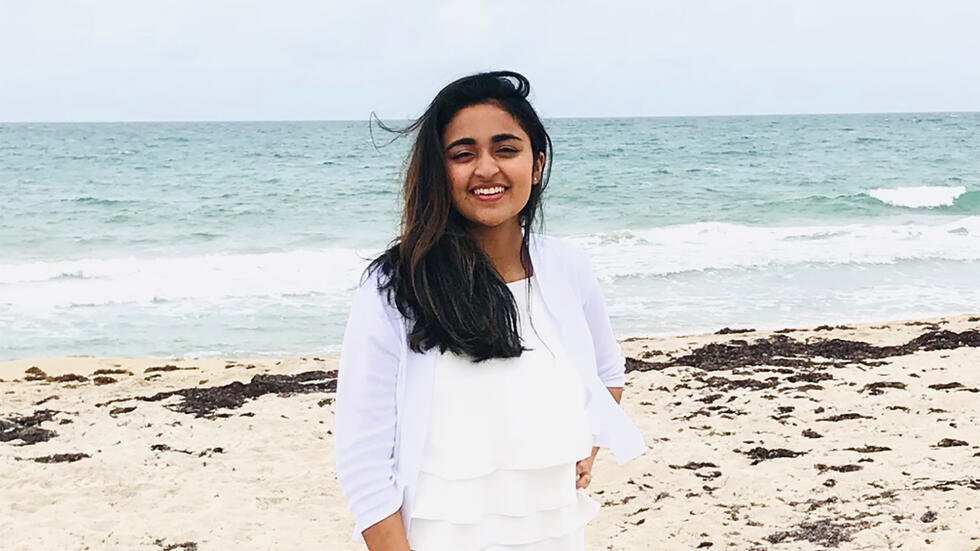 Sana Shareef '22, Co-President of the Facilitators for Religious Ethical and Spiritual Inquiry, Photo Courtesy of Sana Shareef.
Sana Shareef '22, Co-President of the Facilitators for Religious Ethical and Spiritual Inquiry, Photo Courtesy of Sana Shareef.
By Sana Shareef '22
Co-President of the Facilitators for Religious Ethical and Spiritual Inquiry
“Jaan” an Urdu term of endearment my mother uses often, “I have to tell you something”. What followed was heard but not understood. My mind spun with doubt, constantly circling back to what I heard with a raging feeling of denial. “Someone who went to a mosque nearby from our community attacked a nightclub in Orlando called Pulse” For a little while I thought it was just an unsettling fever dream that my mind constructed from the Florida heat of that day. But after reading all those news articles, watching reporters and hearing about it by word of mouth, it became concretized, it actually happened. I wanted to feel more empathetic, but all I could feel in the midst of it all - the memorials, the media coverage, the ensuing Islamophobic sentiment in my town - was a stagnant pang of numbness. It was a personal trauma that I couldn’t emotionally cope with. Not until it all blew over.
I joined Harvard equipped with an energy to involve myself in interfaith work following this very personal trauma, hoping to do anything in my power to foster peaceful relations and dismantle religious stereotypes. After having joined the Interfaith Forum, I was offered the opportunity to join the Facilitators for Religious, Ethical and Spiritual Inquiry, a small but mighty group empowered to facilitate conversations rooted in life’s biggest questions about meaning, purpose, authentic success, and happiness. I was not only able to facilitate dialogue on topics acting on my spirit, but I also met and continue to meet such dynamic and passionate people some whom I have the honor of working with - Bilal, Pranati, and Abby.
I thought I wouldn’t feel that searing numbness again because such a protracted trauma would be unlikely. But I was wrong. Six months into the COVID-19 pandemic, my days have continued to bleed together. Despite pockets of ritual and soul-nourishing activities like family dinners, prayer, and warm walks, the backdrop of tragedy beyond the pandemic - wildfires and hurricanes, racial injustices, ethnic cleansings, geopolitical strife, economic decline, RBG’s passing and the ensuing election tensions - seems to keep adding weight to the monotony of it all. One hundred thousand deaths was met with shock but upon nearing the 200,000 death mark, that all too familiar numbness that I felt four years ago has crept again. Paul Slovic, a psychologist at the University of Oregon labels this as “psychic numbing” - the grim death toll can result in disengagement and apathy as tragedy and loss of life at a large scale becomes difficult to process.
I go back however to several conversations that the Facilitators for Religious, Ethical, and Spirituality (FRESI) had with Harvard Chaplains. The fortification of resilience develops from confronting those uncomfortable feelings which come from reckoning with the loss that we face now - anxiety, depression, sadness, hopelessness. I’m stopping myself from feeling these things from fear that it might be too much.
But I realize I had forgotten a verse dear to my heart - “God does not burden a soul beyond what it can bear” [Quran 2:286]. Psalm 34:18 beautifully captures a very similar sentiment, “The Lord is near to the brokenhearted and saves the crushed in spirit.”
In the Islamic tradition, believers are advised to avoid despair for we run the risk of “extinguishing God’s light” [61:8] But we can confront our emotions and the pain of our current situation to dig beyond despair and despondency for strength, hope, and compassion during this uncertainty. In an effort to help students feel deeply and navigate this pain, FRESI hosted another conversation entitled: “Faith and Resilience: a Conversation with President and Mrs. Bacow”. I’d like to believe it helped those in attendance in a time of still distance to reach inwards and realize they have the capacity to endure much more than they thought they could.
Reflecting on our most recent webinar with clinicians from the Benson-Henry Institute for Mind-Body Medicine on how spiritual meditation and ritual practices can recover significant benefits for health and well-being, I’ve realized my prayer before was almost empty without the confrontation of those emotions, of pain. Meditating on the pain we can handle is a step towards separation from numbness, avoidance of compassion fatigue, and resilience and empathy building. With pain comes healing and that’s all we can look forward to right now.
Sana Shareef is a junior in Mather Houses studying Human, Developmental, & Regenerative Biology with a secondary in Comparative Study of Religion. She is the Co-President of the Facilitators for Religious Ethical and Spiritual Inquiry, an interfaith organization on campus aimed at creating spaces for spiritual and ethical dialogue and has been an Interfaith Forum member since coming to the College. She is taking online classes from her home in Port St. Lucie, Florida but her spirit and heart reside in Cambridge.
